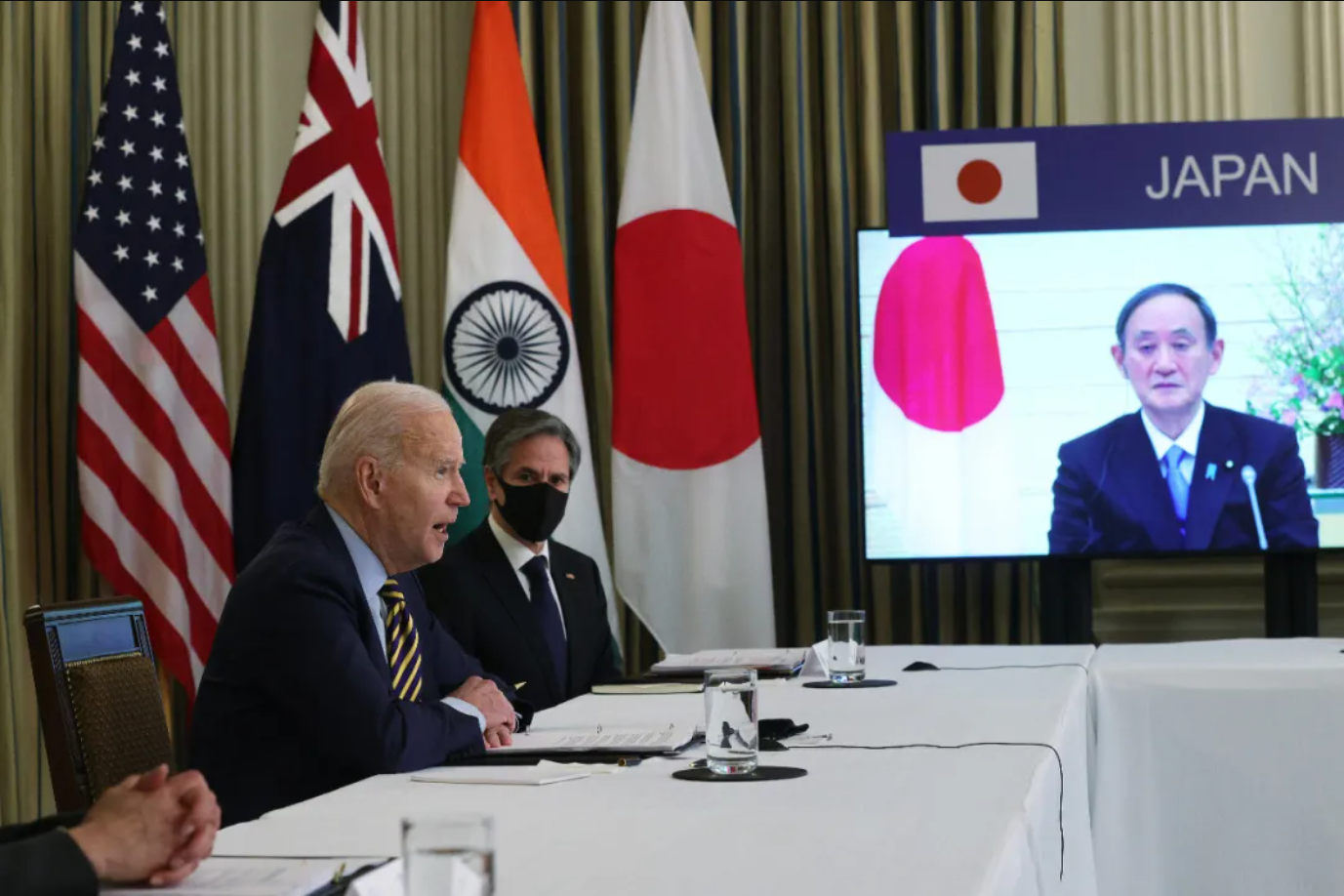Zhou Bo: Senior Fellow, CISS, Tsinghua University, China Forum Expert
The largest question hovering over the Quadrilateral Security Dialogue, or Quad, grouping of the United States, Japan, Australia and India is what exactly it is.
Initiated in 2007 by Japanese Prime Minister Shinzo Abe, the forum did little to coordinate policy in the Indo-Pacific. This is why when US President Joe Biden hosted the first virtual Quad summit on March 12 with Japanese Prime Minister Yoshihide Suga, Indian Prime Minister Narendra Modi and Australian Prime Minister Scott Morrison, it caught the world’s attention, especially the announcement of a “Quad Vaccine Partnership” that committed to providing at least 1 billion doses of vaccine to Southeast Asia.
However, this summit is not necessarily a springboard to success. As if to indicate that it is a ‘concert of democracy’, the Quad’s catchphrase is a “free and open Indo-Pacific”. But when has the Indo-Pacific not been open and free? Security challenges, including piracy, terrorism, territorial claims, illegal fishing and criminal trafficking, are not new, and they are not exclusive to the Indo-Pacific.

Since 2008, the most outstanding problem affecting the security of the international sea lanes in the region has been piracy in the waters off the Horn of Africa. This problem has been largely resolved thanks to the joint efforts of some 25 international navies in line with UN Security Council mandates.
The Quad is really about China, even if China was not explicitly mentioned in the summit. The problem is that if the Quad is against China, the glue that binds the group is not strong enough. If it is not, then there is no need to establish the Quad at all.
Let us start with the worst possible scenario. Should a conflict arise between China and the US in the South China Sea or the Taiwan Strait, Japan and Australia would struggle to figure out how to fulfil their obligations as American allies without burning their own hands.
India would not give a damn about taking America’s side at all. The likelihood of India getting involved militarily in a China-US conflict in China’s periphery is as remote as the US’ military involvement in a China-India conflict along the Sino-Indian border.
Admittedly, the brawl resulting in the deaths of 20 Indian soldiers and four Chinese soldiers in the Galwan Valley last June was shocking, to the extent that Indian External Affairs Minister Subrahmanyam Jaishankar said India’s trust in China was “profoundly disturbed”.
But the fact the troops chose to use fists and wooden clubs to fight in a stone-age manner showed they knew they should not shoot at each other under any circumstances.
Since the Chinese and Indian troops have withdrawn and a de facto buffer zone was established, the situation has de-escalated. Hopefully, the deadly brawl will provide useful lessons for the two governments in finding new ways to enhance confidence-building, such as setting up hotlines.
India is central to the Quad as the other three countries are already allies. Although India is not happy with the presence of China’s navy in the Indian Ocean, which it considers its own backyard, there is no evidence of conflicting interests.
The Chinese navy only has a base in Djibouti, and Chinese flotillas only conduct counter-piracy operations. In May 2011, the Chinese and Indian navies cooperated with Nato in rescuing the Chinese merchant ship Full City that had been hijacked by Somalian pirates.
If India chooses to embrace the United States, it will invite two consequences it cannot afford. First, it risks India’s strategic autonomy and manoeuvrability among major powers. This matters as India is one of the founders of the non-aligned movement.
Second, it risks a decline in India-Russia relations. India is the world’s second-biggest arms importer with Russia as its top supplier, garnering half of the Indian market. Any move by New Delhi towards Washington will only alarm Moscow, one of Washington’s strategic competitors alongside Beijing.
However the Quad might evolve, it is unlikely to become an “Asian Nato” targeting China. This is not because all parties have disclaimed any defence role for the grouping at one point or another, but rather that each Quad member has a strong economic relationship with China.
China is one of the US’ top trading partners and the largest trading partner of Japan, Australia and India. None of them would wish to sacrifice their own economic ties with China, let alone for the sake of the other three countries.
Likewise, it is doubtful “Quad Plus” countries such as South Korea, Vietnam and New Zealand would wish to join the Quad as full members for fear of Beijing seeing them as members of an “anti-China club”. They might still participate in a few multilateral naval exercises such as the Malabar Exercise in the future, though.
What holds Quad members together will not be the much-touted partnership on climate change and the Covid-19 pandemic. These are global challenges that can only be addressed through a collective global response. If the Quad’s future is maritime security cooperation, as most people would agree, there is also a limit as to what it can achieve.
The Indian and Pacific Oceans are too vast for four policemen. Besides, cooperation on addressing maritime issues such as terrorism, human trafficking, humanitarian aid and disaster relief is the purview of regional institutions such as the Asean Regional Forum and Asean Defence Ministers Meeting Plus. Those groupings already include major regional players such as China, the US, Japan, Australia and India.
Unless the Quad takes common strategic issues in the region as driving forces and proves itself to be inclusive rather than exclusive, the future of the small group is not bright. It can survive, but it will not thrive.
